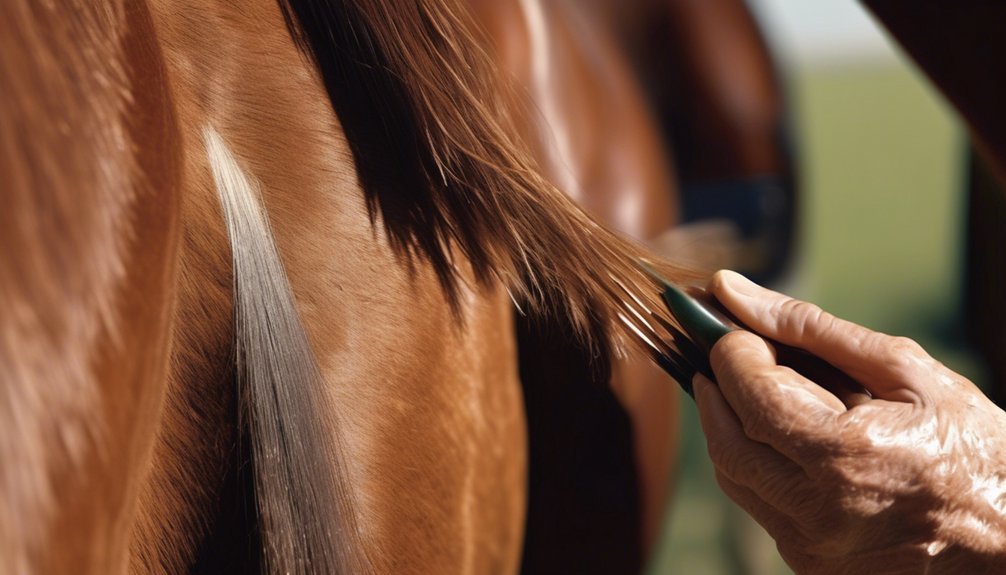
Grooming a horse with skin sensitivities can feel like navigating a minefield; one wrong move, and you risk causing discomfort. It's crucial to understand their unique needs and adapt your approach. By selecting the right tools and techniques, you can create a soothing experience that promotes their skin health. But what specific steps can you take to ensure your grooming routine is both effective and gentle? Let's explore the best practices together.
Key Takeaways
- Use soft bristle brushes and rubber curry combs to minimize irritation on sensitive areas while effectively removing dirt.
- Establish a consistent grooming routine, adjusting techniques seasonally to accommodate skin sensitivity and comfort needs.
- Bathe with gentle cleansers in lukewarm water, avoiding the face initially and thoroughly rinsing to prevent irritation.
- Regularly monitor your horse's skin for signs of allergies or infections, adjusting grooming practices as necessary.
- Consult a veterinarian for tailored treatment options if skin issues persist or worsen, ensuring proper care.
Understanding Skin Sensitivities in Horses

While you may not always see it, horses can have sensitive skin that requires your careful attention. Understanding skin allergies is crucial for their well-being.
These allergies may stem from various environmental factors, like pollen, dust mites, or certain plants. If you notice any signs of discomfort—such as scratching, redness, or hair loss—it's essential to assess their surroundings and identify potential triggers.
Regularly check your horse's living area for irritants, and consider seasonal changes that may affect their skin. By being vigilant and compassionate, you can better support your horse's health.
Choosing the Right Grooming Tools
Choosing the right grooming tools is essential for maintaining your horse's health and comfort. When selecting grooming brushes, consider the specific needs of your horse's skin.
Soft bristle brushes are perfect for sensitive areas, while rubber curry combs can effectively remove dirt and stimulate circulation. Look for tools made from gentle, non-irritating materials like natural fibers, which can help prevent skin issues.
Avoid plastic brushes that may cause discomfort. It's also important to have a variety of brushes on hand, so you can tailor your grooming routine to your horse's condition.
Establishing a Consistent Grooming Routine

Establishing a consistent grooming routine is crucial for your horse's overall well-being and helps strengthen your bond.
Regular grooming not only promotes skin health but also allows you to catch potential issues early.
Consider these tips to create an effective routine:
- Determine an appropriate grooming frequency based on your horse's needs.
- Adjust your grooming practices seasonally; for example, use lighter tools in warmer months.
- Incorporate a variety of grooming techniques to keep your horse engaged.
- Make grooming a calming experience by speaking softly and using gentle strokes.
- Monitor your horse's skin condition regularly to adapt your routine accordingly.
Bathing Techniques for Sensitive Skin
When your horse has sensitive skin, bathing requires extra care to ensure comfort and cleanliness without causing irritation.
Start by using gentle cleansers specifically formulated for sensitive skin. These products are less likely to strip natural oils and provoke reactions.
Fill a bucket with lukewarm water, as extreme temperatures can be uncomfortable. Gently wet your horse's coat, avoiding the face initially, and apply the gentle cleanser using your hands or a soft sponge.
Rinse thoroughly to remove all soap residue, which can cause further irritation. Be patient and attentive, observing your horse's reactions throughout the process.
After bathing, dry your horse gently with a soft towel, ensuring they feel comfortable and cared for. This nurturing approach will help maintain their skin health.
Identifying and Treating Common Skin Issues

After ensuring your horse's skin is clean and healthy through careful bathing, it's important to be vigilant about identifying and treating common skin issues that can arise.
You might notice signs like itching, redness, or lesions, which could indicate skin allergies caused by environmental factors, food, or parasites.
Here are some common skin issues to look out for:
- Rain rot: Bacterial infection causing scabs.
- Sweet itch: Allergic reaction to insect bites.
- Fungal infections: Causing hair loss and irritation.
- Contact dermatitis: Resulting from irritants like bedding or grooming products.
- Mange: Caused by mites leading to severe itching.
Effective treatments include topical medications, dietary adjustments, and regular grooming to prevent irritants.
Always consult your vet for personalized care.
Additional Tips for Maintaining Skin Health
To keep your horse's skin in prime condition, regular maintenance is key. Incorporate gentle grooming routines that stimulate circulation and remove dirt.
Beyond grooming, consider adding dietary supplements rich in omega fatty acids to promote a healthy coat and skin barrier. Natural remedies like aloe vera or coconut oil can soothe irritations and provide moisture.
Always ensure your horse stays hydrated, as proper hydration supports skin elasticity. If you notice any changes, don't hesitate to consult your vet for tailored advice.
Building a consistent regimen not only strengthens your bond but also ensures your horse feels comfortable in its skin. Your attentive care can make a significant difference in maintaining their skin health.
Frequently Asked Questions
Can Diet Affect My Horse's Skin Health?
Yes, your horse's diet significantly impacts skin health. Including nutritional supplements can enhance skin hydration, helping to prevent issues. Prioritize a balanced diet, and your horse will thrive with a healthy, vibrant coat.
How Often Should I Consult a Veterinarian About Skin Issues?
You should consult your veterinarian about skin care at least every six months, or sooner if you notice changes. Regular visits help catch issues early, ensuring your horse stays healthy and comfortable. You're not alone in this!
Are There Specific Breeds More Prone to Skin Problems?
Certain skin problem breeds, like the Arabian and Thoroughbred, show higher breed susceptibility to skin issues. Keeping an eye on these breeds' unique tendencies helps you manage their health effectively and compassionately.
What Are the Signs of an Allergic Reaction in Horses?
When you notice allergy symptoms in your horse, watch for skin irritation, excessive scratching, swelling, or hives. These signs indicate discomfort, so it's essential to address them promptly for your horse's well-being and comfort.
Can Environmental Factors Contribute to My Horse's Skin Sensitivities?
Imagine a flower wilting from sudden humidity changes. Just like that, your horse can struggle with skin sensitivities. Seasonal changes and fluctuating humidity levels can greatly affect their skin health and comfort. Keep an eye out!
Conclusion
By following these grooming tips, you can transform your horse's skin care routine into a soothing spa day, making them feel like royalty! Remember, consistency is key, and being attentive to their needs will go a long way. Always monitor for any signs of irritation and don't hesitate to consult your vet for expert advice. With patience and the right approach, you can keep your horse comfortable and healthy, ensuring they enjoy life to the fullest.





